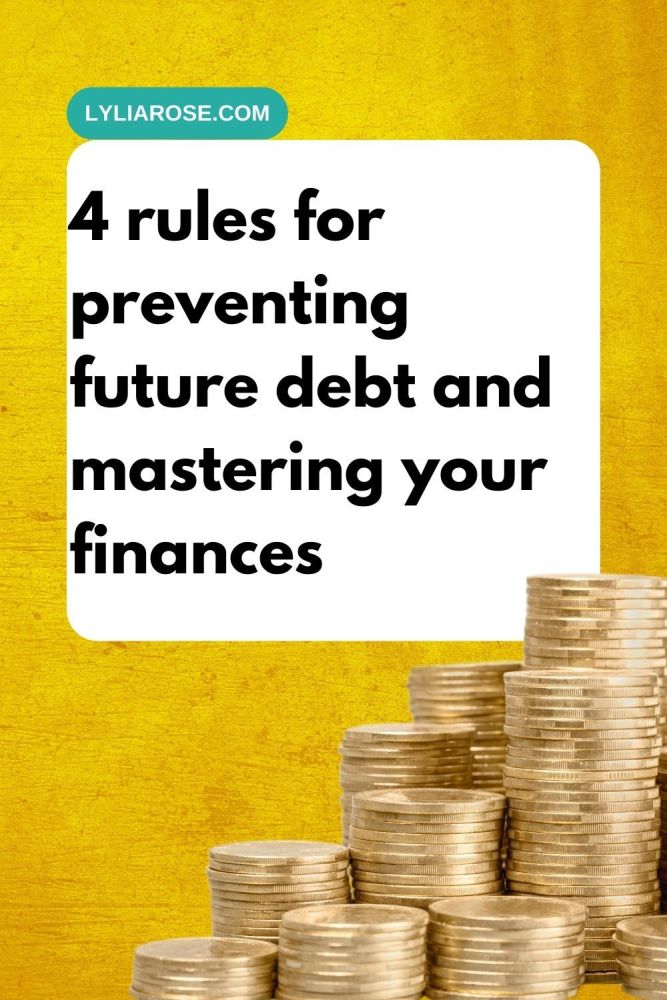4 Rules for Preventing Future Debt and Mastering Your Finances
Posted on
Money. It’s great to have, and stressful when you don’t have enough of it.
The frustrating part is that almost nobody ever feels like they have enough. People on average incomes feel it. High earners feel it. Even some of the wealthiest people in the world talk openly about feeling dissatisfied with their finances. And we have all seen the headlines about celebrities and lottery winners who earn or win huge sums, only to end up bankrupt years later.
In fact, it’s often suggested that many lottery winners find themselves broke within five years of their big win. That might sound shocking, but it makes a lot more sense when you realise something important.
Being financially secure is not just about how much money you earn. It’s about how you manage it. It’s about habits, decisions, and boundaries you stick to when no one else is watching.
You can earn a solid income and still feel constantly behind. Or you can earn a modest income and feel calm, organised, and in control. The difference usually comes down to how you handle the money that passes through your hands.
Even in a time when budgeting tools, debt advice, and financial education are easier to access than ever, many people still struggle with overspending, creeping debt, and that uncomfortable feeling of never quite catching up.
The good news is that mastering your finances does not require extreme deprivation or complicated systems. It comes down to a few core rules that, when followed consistently, make everything else easier.
Below are four practical rules that can help prevent future debt and give you a stronger sense of control over your money.

1. Don’t spend what you don’t have
This might sound obvious. Almost insultingly obvious. And yet, it is one of the hardest rules for people to follow consistently.
At its core, the principle is simple. Do not spend money you do not already have. In other words, do not live on credit as a default way of life.
Credit cards are not inherently bad. Used properly, they can be useful tools. They can add extra protection when shopping online, help spread the cost of unavoidable expenses, or be used carefully to build a better credit score. But that is very different from using them to fund everyday lifestyle choices.
Too many people treat a credit card like a second bank account.
Your balance is running low, but you want a new pair of boots. Put it on the credit card.
There’s no room in the budget for a night out. Put it on the credit card.
The month feels long and payday feels far away. Put it on the credit card.
This is where trouble starts.
A credit card is not free money. It is borrowed money. It is spending tomorrow’s income today. When this becomes a habit, you end up permanently living one step ahead of yourself, always trying to catch up, always feeling like your money is already spoken for.
Over time, this creates a cycle that is hard to escape. Interest builds. Minimum payments feel manageable at first. Then something unexpected happens and the balance never quite comes back down.
If you want to prevent future debt, you need a clear mental boundary. If the money is not already in your account, it is not available to spend, unless it is genuinely unavoidable.
Living within your means does not mean never enjoying life. It means making choices you can actually afford, without borrowing from your future self. And when you do use a credit card, pay it off as quickly as possible so it does not linger in the background of your finances.
2. Sleep on every substantial financial decision
One of the most damaging money habits is impulsive spending.
These are the purchases where, deep down, you know you should pause. You should check your budget. You should think it through. But instead, you silence that inner voice and act on the feeling of the moment.
Compulsive spending often feels harmless at first. It can even feel rewarding. You see something you like, you feel excited, and buying it gives you a quick hit of satisfaction. But when this becomes a pattern, it quietly erodes your financial stability.
Many people get into the habit of spending everything as soon as they receive it. The money comes in, and before it has time to do anything useful, it is gone. Often on things that add very little long term value.
Even purchases that might genuinely be useful can become mistakes if they are made without thought. Buying at the wrong time, paying more than necessary, or committing to something you did not properly plan for can all create stress later.
A simple rule helps here. If a purchase is bigger than everyday essentials, sleep on it.
That means no instant decisions. No buying in the heat of the moment. Give yourself at least one night to think it over.
The next day, one of two things usually happens. Either the excitement fades and you realise you do not actually want or need the thing as much as you thought. Or you still want it, but now you are making the decision calmly, with a clear head. Or, perhaps you can actually use that money for something more structural, such as life insurance or putting it aside for a better car next time you buy one.
This pause is powerful because impulsive spending is often driven by emotion rather than logic. Excitement, boredom, stress, or even a desire for comfort can all push us towards spending. Time allows those feelings to settle so your rational mind can step in.
Sleeping on financial decisions does not mean denying yourself everything. It means choosing intentionally, rather than reacting.
3. Budget for the unexpected
Many budgets fail for one simple reason. They assume life will behave itself.
On paper, everything adds up neatly. Bills are covered. Savings are allocated. Spending looks sensible. But then something unexpected happens and the whole plan collapses.
The car needs repairs.
A family event comes up.
A household item breaks.
Clothes wear out sooner than expected.
These things are not rare. They are normal. Yet many people do not plan for them at all.
A budget without flexibility is not realistic. And a budget that leaves no room for enjoyment is just as fragile. If every spare pound is allocated to savings and none is set aside for small pleasures, social plans, or hobbies, burnout is almost guaranteed.
When creating a budget, honesty matters more than perfection.
You need a category for unexpected or forgotten expenses, and it needs to be properly funded. This is not pessimism. It is preparation.
Each month, set aside money specifically for things you cannot predict. Over time, this buffer stops small surprises from turning into financial emergencies.
At the same time, allow yourself space for life. If you enjoy the occasional coffee out, night out, or treat, include it. Pretending those expenses do not exist does not make them disappear. It just pushes them onto credit later.
A good budget supports your real life, not an idealised version of it.
4. Use digital tools to help you keep track
Managing money no longer requires notebooks, ledgers, or complicated systems. Technology has made it far easier to see what is happening with your finances in real time.
The most important thing is not which tool you use, but that you use something consistently.
Some people prefer spreadsheets. Others prefer apps. The best option is the one you will actually stick with over the long term.
Budgeting apps can help you see where your money goes, track spending categories, and adjust as life changes. Many link directly to your bank accounts so you can spot patterns you might otherwise miss.
If you run a business or freelance, accounting software can help you separate personal and business finances, track expenses, and stay organised without adding extra stress.
And if you invest, some platforms offer tools that help you keep an eye on your portfolio and make adjustments as needed. If you want support managing your investments through your broker, a rebalancing tool can help keep things aligned without requiring constant attention.
The point is not to obsess over numbers. It is to remove guesswork. When you know exactly what is coming in and going out, decisions become easier. You stop relying on feelings and start working with facts.
If you have ever reached the end of the month wondering where your money went, simple tracking tools can be a real turning point.

Bringing it all together
Preventing future debt is not about being perfect with money. It is about building habits that protect you when life gets messy.
Not spending money you do not have creates a solid foundation.
Sleeping on big decisions reduces regret.
Budgeting for the unexpected keeps small problems small.
Using tools gives you clarity instead of guesswork.
None of these rules require extreme discipline. They just require consistency.
Mastering your finances is less about earning more and more about respecting the money you already have. When you treat it with care, it tends to stick around longer.
And that sense of control, calm, and confidence is worth far more than any impulse purchase.
If you’re trying to avoid future debt, the simplest place to start is this: slow down, plan realistically, and make decisions your future self will thank you for.
Money doesn’t need to feel overwhelming. With a few clear rules, it can start to feel manageable again.
Taking control of your finances isn’t about restriction or punishment. It’s about creating a life where money supports your choices, instead of limiting them. And once that shift happens, everything else gets easier.
More debt related blog posts
- How to overpay a personal loan + save money
- My honest debt story
- What to do if you’re struggling to manage your finances
- How we saved £6500 in 6 months
- Why I’m saving an emergency fund before paying off my debt
- How to raise the cash for an unexpected bill
- What to do when you don't have the cash for essential household items
- 10 money tips to keep your finances healthy
- Why I do what I do: my plans for the future.

